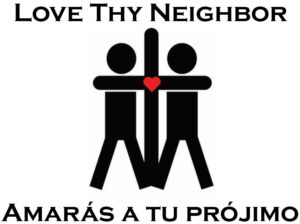
Our Lenten Journey / Caminar en Cuaresma
versión en español
Saturday – March 4 – Day 10
The Perfection of Love
“But I say to you, love your enemies, and pray for those who persecute you, that you may be children of your heavenly Father, for he makes his sun rise on the bad and the good, and causes rain to fall on the just and the unjust.” Matthew 5:44–45
Today’s Gospel ends with Jesus saying, “So be perfect, just as your heavenly Father is perfect.” This is a high calling! And it is clear that part of the perfection to which you are called requires a generous and total love even for those you may consider your “enemies” and those who “persecute” you.
When faced with this high calling, one immediate reaction could be that of discouragement. When faced with such a challenging command, it is understandable that you may feel incapable of such a love, especially when the hurt caused by another is ongoing. But there is another reaction that is entirely possible and one for which we should aim. And that reaction is deep gratitude.
The gratitude we should allow ourselves to experience is on account of the fact that our Lord wants us to share in His life of perfection. And the fact that He commands us to live this life also tells us that it is entirely possible. What a gift! What an honor it is to be invited by our Lord to love with His very heart and to love to the extent that He loves all people. The fact that we are all called to this level of love should result in our hearts giving deep thanks to our Lord.
If discouragement, however, is your immediate reaction to this calling from Jesus, try to look at others from a new perspective. Try to suspend judgment toward them, especially against those who have and continue to hurt you the most. It’s not your place to judge; it’s your place only to love and to see others as the children of God who they are. If you dwell upon another’s hurtful actions, angry feelings will inevitably arise. But if you strive only to see them as children of God whom you are called to love without reserve, then even feelings of love will more easily arise within you, helping you to fulfill this glorious command.
Reflect, today, upon this high calling of love and work to foster gratitude within your heart. The Lord wants to give you an incredible gift by loving all people with His heart, including those who tempt you to anger. Love them, see them as God’s children and allow God to draw you into the heights of perfection to which you are called.
Can I show love to those I feel are least deserving of my love?
Let us pray:
My most perfect Lord, I thank You for loving me despite my many sins. I thank You for also calling me to share in the depths of Your love for others. Give me the eyes to see all people as You see them and to love them as You love them. I do love You, Lord. Help me to love You and others more.
Source: mycatholic.life
USCCB Daily Readings: bible.usccb.org/bible/readings/030423.cfm
Sábado- 4 de marzo – Día 10
La perfección del amor
Yo, en cambio, les digo: Amen a sus enemigos, hagan el bien a los que los odian y rueguen por los que los persiguen y calumnian, para que sean hijos de su Padre celestial que hace salir su sol sobre los buenos y los malos, y manda su lluvia sobre los justos y los injustos. Mateo 5:44–45
El Evangelio de hoy termina con Jesús diciendo: “Sed, pues, perfectos, como vuestro Padre celestial es perfecto”. ¡Este es un gran llamado! Y está claro que parte de la perfección a la que estáis llamados exige un amor generoso y total, incluso por aquellos a los que podéis considerar vuestros “enemigos” y aquellos que os “persiguen”.
Ante este alto llamado, una reacción inmediata podría ser el desánimo. Cuando te enfrentas a un mandato tan desafiante, es comprensible que te sientas incapaz de tal amor, especialmente cuando el dolor causado por otro continúa. Pero hay otra reacción que es totalmente posible ya la que debemos apuntar. Y esa reacción es una profunda gratitud.
La gratitud que debemos permitirnos experimentar es por el hecho de que nuestro Señor nos quiere partícipes de su vida de perfección. Y el hecho de que Él nos ordene vivir esta vida también nos dice que es completamente posible. ¡Qué regalo! Qué honor es ser invitado por nuestro Señor a amar con su mismo corazón y amar en la medida en que Él ama a todas las personas. El hecho de que todos estemos llamados a este nivel de amor debe hacer que nuestros corazones den gracias profundas a nuestro Señor.
Sin embargo, si el desánimo es su reacción inmediata a este llamado de Jesús, intente mirar a los demás desde una nueva perspectiva. Trate de suspender el juicio hacia ellos, especialmente contra aquellos que lo han lastimado y continúan lastimándolo más. No es tu lugar juzgar; es tu lugar solo amar y ver a los demás como los hijos de Dios que son. Si piensas en las acciones hirientes de otra persona, inevitablemente surgirán sentimientos de ira. Pero si os esforzáis sólo por verlos como hijos de Dios a los que estáis llamados a amar sin reservas, entonces surgirán más fácilmente en vosotros también sentimientos de amor que os ayudarán a cumplir este mandato glorioso.
Reflexiona, hoy, sobre este alto llamado de amor y trabaja para fomentar la gratitud dentro de tu corazón. El Señor quiere darte un regalo increíble al amar a todas las personas con Su corazón, incluso a aquellos que te tientan a la ira. Ámenlos, véanlos como hijos de Dios y permitan que Dios los lleve a las alturas de perfección a las que están llamados.
¿Puedo mostrar amor a aquellos que siento que menos merecen mi amor?
Oremos:
Mi Señor misericordiosísimo, te agradezco por perdonarme y por amarme con tanta perfección y totalidad. Gracias por reconciliarte conmigo a pesar de mi imperfecta contrición. Dame un corazón, amado Señor, que busque siempre amar al pecador en mi vida. Ayúdame a ofrecer a los demás una misericordia plena a imitación de Tu divina misericordia.
Lecturas de Hoy: bible.usccb.org/es/bible/lecturas/030423.cfm








